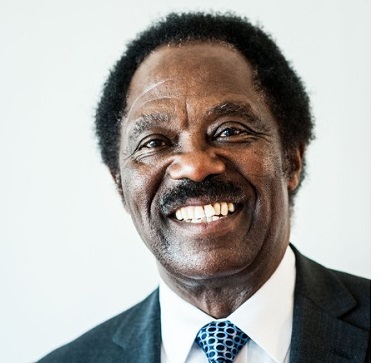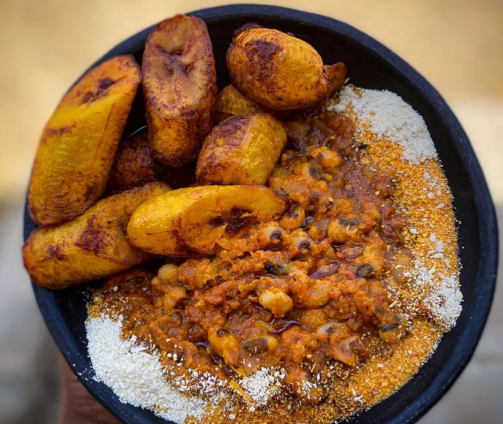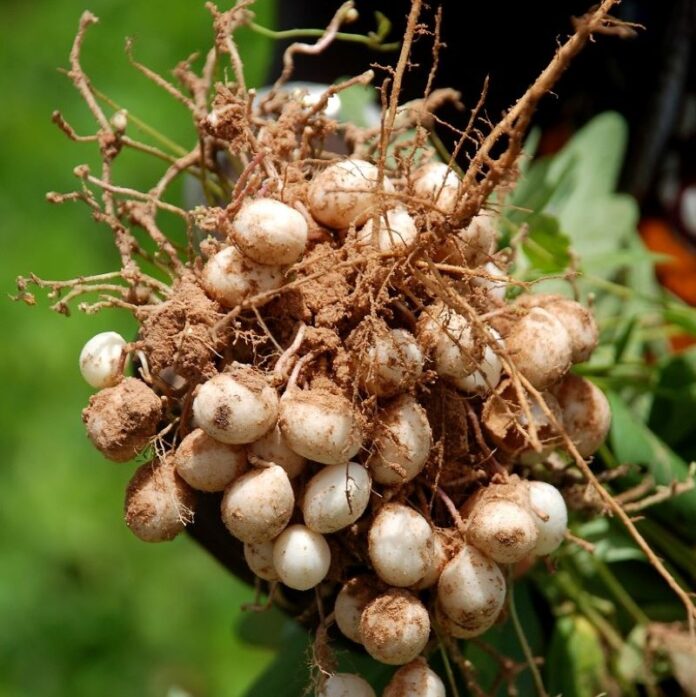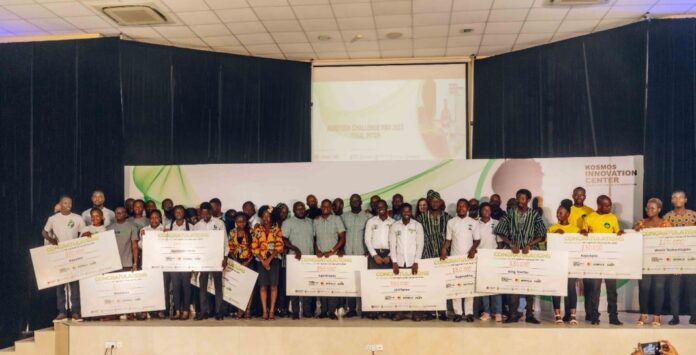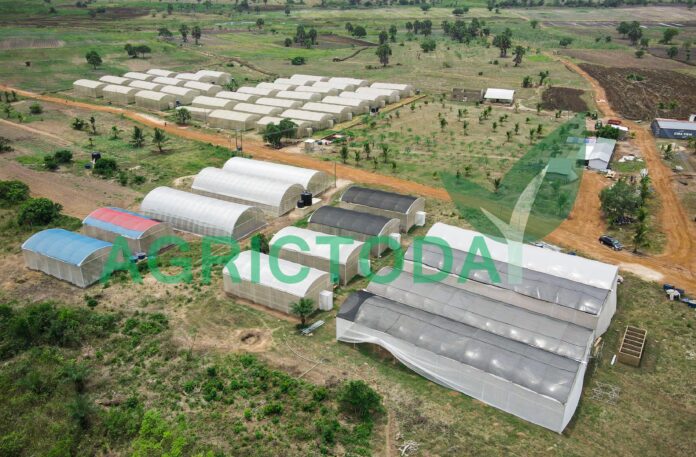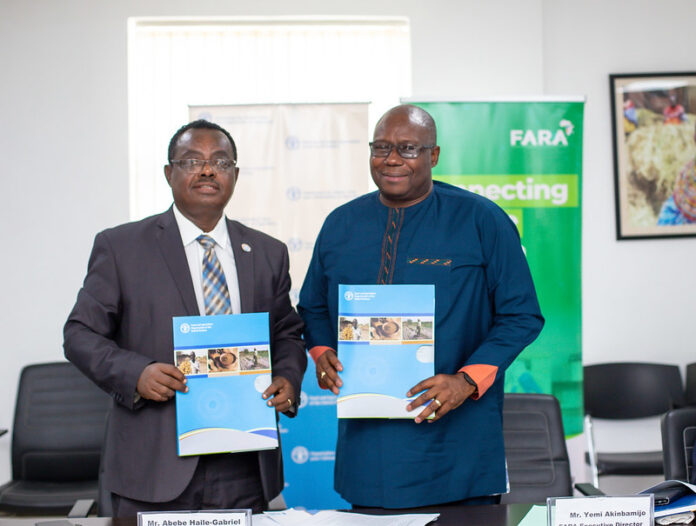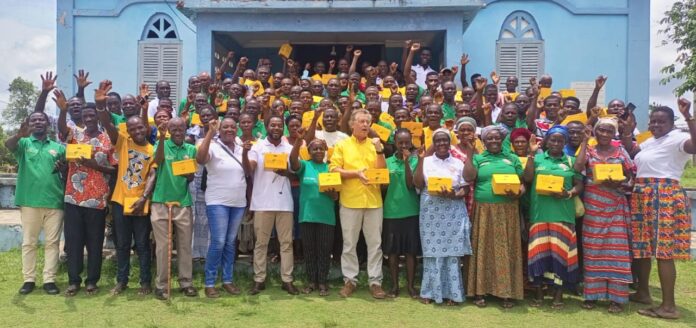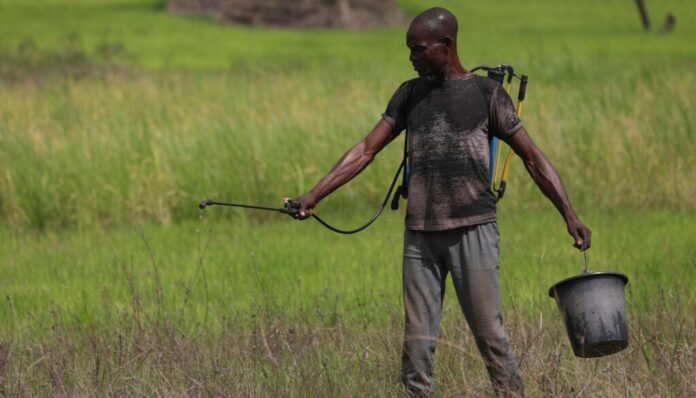Emeritus Professor Kofi Aidoo has been appointed to the Food and Agriculture Organization of the United Nations (FAO) and the World Health Organization (WHO) Joint Expert Committee on Food Additives and Contaminants (JECFA).
Ayikoi Otoo aggravated by Yↄ Kɛ Gari’s description as Gobɛ
Nii Ayikoi Otoo, the President of the Ga Dangme Council is peeved by the description of a Ghanaian delicacy.
The popular food is made of cooked beans and gari garnished with fried plantain and red oil.
Some people call it ‘Yↄ K) gari’ while others term it ‘Gobɛ’. However, the one-time Attorney General and Minister for Justice’s concern is with the latter.
Mr Otoo fumed that ‘the name of my favourite food: ‘Yↄ k) gari’, to with beans and gari in the Ga language, has all of a sudden been turned into gobɛ.”
“Our foods were prepared and sold widely and we all knew ‘Yↄ k) gari or Yoo kɛ tatale’. Today, we hear the same food being referred to as gobe.” He was venting on JoyNews’ Upfront on Thursday, April 13.
The former diplomat told Raymond Acquah that “changing the local name for this staple food is dangerous.”
Atikoi Otoo fears that the supposed renaming of the food formed part of the gradual dissipation of the Ga Dangbe culture.
“I have throughout my adult life witnessed the shedding off of the beautiful flowers from the Ga Dangme tree we came to meet. Ga Dangme language was widely spoken and taught in our schools; Ga Dangme books were in abundance; church services; singing and preaching were all done in the GaDangme language and interpreted in Akan.”
Knox Consulting organises maiden agric business owners’ forum.
Industry players in the agriculture value chain met to analyse gaps recognised in graduates from agriculture tertiary institutions when they enter the job market.
The forum was held at Erata hotel by Knox Consulting for sector experts to brainstorm on developing practical and hands-on supplementary content for agricultural colleges and institutions to equip graduates for the job market.
The forum formed part of activities being rolled out by Knox Consulting with support from the SofTtribe under its “Bridging the Devices and Connectivity Gaps for Students in Agriculture in Ghana’’ project with the Mastercard Foundation.
Specifically designed for business owners/practitioners in the agriculture space, the objective was for participants to amongst others: Share experiences on the practical know-how needed by graduates to succeed in the industry and brainstorm on the relevant skills-set required to augment tertiary institution training for the job market.
Speaking at the forum, the Managing Partner of Knox Consulting, Mrs. Sheila Assibey-Yeboah, indicated that Ideas collated from the deliberations would offer project implementers with ample tools to aid in offering supplementary content for students in tertiary institutions as well as provide in-depth understanding into the pertinent human resource bottlenecks affecting the industry.
“We believe this is important in helping the project develop a comprehensive approach to bridging the current knowledge gap when fresh graduates enter the job market in the agriculture space” she said.
Mrs. Sheila Assibey-Yeboah also observed that only a hand-full of agriculture graduates end up actively working in same sector.
The trend is worrying and there is the need to address this challenge, she added. The forum was attended by sector players from the diverse agriculture value chains including livestock, poultry, tree crops, fruits, vegetables, agri-inputs and service providers.
About Knox Consulting
It is a consultancy network organisation that focuses on project/company support, advisory services, capacity strengthening, advocacy and improved systems in the Agriculture, Agribusiness, Economic and Finance sectors in Ghana.
Africa’s “forgotten” food crops key to support climate-resilient, healthy and profitable food system.
Through climate niche modeling, new research has identified how forgotten food crops can diversify or replace major staple crops in sub-Saharan Africa by 2070 and benefit micronutrient supply. The study identified 58 crops, including “better-adapted and more nutritious” vegetables, fruits, cereals, pulses, seeds, nuts, roots and tubers.
Around 10% of the production locations of major staples in sub-Saharan Africa – corn, rice, yams and cassava – may experience novel climate conditions in 50 years, meaning that they will no longer be suitable climates for these staple crops.
“I wholeheartedly concur with the study’s conclusion that Africa’s ‘forgotten’ food crops offer opportunities both for more climate-resilient agriculture and healthier food systems and that their promotion has received limited attention,” Gus Le Breton, African plant hunter at Baobab Exports, tells FoodIngredientsFirst.
“There are complex reasons that forgotten food crops have received such limited attention. The good news is that these can – and indeed must – be overcome. I believe we are on the brink of a new golden age of research into traditional and underutilized food crops worldwide and I’m convinced that Africa will be at the forefront.”
Forgotten food crop potential
Lead author Dr. Maarten van Zonneveld of the World Vegetable Center in Taiwan, explains that many of the 58 forgotten crops in the study are annuals and tree fruits that are rich in vitamin A and C and many are vegetables high in vitamin A, iron, folate and zinc.
“Our study shows that in most locations where maize, rice, yams and cassava are grown in sub-Saharan Africa, one or more forgotten food crops from the different food groups will be suitable for cultivation under 2070 climate conditions and diversify production zones of major staples to support more nutrient-rich diets,” he explains.
Le Breton highlights several examples of forgotten foods of Africa, such as the baobab fruit, “a superfruit that is both tasty and highly nutritious and is now making waves in the international market.”
The study also looked at the bambara nut, a pulse “with a fabulous flavor” listed as one of the Knorr and WWF Future 50 Foods. Next up, fonio is “possibly Africa’s oldest cultivated grain” with a nutty flavor and an excellent nutrient profile, while teff grass seed from Ethiopia is often seen as the “next super grain.”
“Our biggest success has been with the Baobab fruit, which is now relatively well-known and widely consumed, but we are seeing increased traction with many other species. I’m confident there will be an upsurge in demand for novel African food plants within and beyond Africa,” adds Le Breton.
He adds that the currently limited array of food crops available to consumers has resulted in a “catastrophically unbalanced diet, leading to a spiraling growth of metabolic diseases in Africa.”
Novel climate conditions
Locations with still-suitable climates would decline strongest in West Africa (17.7%) and Central Africa (14.5%).
Though staples must be adapted to the new conditions through breeding, diversification of cropping systems and their replacement with other crops can help promote greater resilience.
“Most of the current food crops are grown in a monocultural system, which is highly vulnerable to pests and drought, explains Le Breton. “This creates a huge vulnerability that one adverse event can cause a total crop failure.”
“These monocultures depend on the use of environmentally unsustainable agrochemicals and – often equally unsustainable – mining underground water resources through irrigation.”
The Global Alliance for Improved Nutrition (GAIN) recently warned that COVID-19, climate change and conflicts wiped out the progress made in malnutrition “over the last 15 years.”
Challenges to overcome
The study, published in Proceedings of the National Academy of Sciences of the United States of America (PNAS), notes that lack of access to appropriate planting material significantly hinders diversifying food production, as is a lack of markets for the foods produced. Le Breton adds that there is a need to “overcome consumer resistance within Africa toward food crops perceived as being old fashioned and outdated.”
He further notes that government agricultural extension services need to be reformed as these have been built around the currently limited array of food crops. Multinational agrochemical and seed companies must be convinced that increased production of forgotten food plants presents opportunities rather than threats.
Moreover, he stresses that “restrictive regulatory environments (e.g., EU Novel Foods) inhibit the uptake of novel African foods in major export markets.” African leaders recently called for “more commitment and accountability in Africa’s efforts to achieve continental and global goals for nutrition, ahead of the 2025 World Health Assembly Nutrition target deadline.”
Putting plans into action
To successfully mainstream these forgotten foods, it is crucial to work closely with local producers and consumers along the value chain, explains study co-author Dr. Stepha McMullin of the Center for International Forestry Research and World Agroforestry research institute (CIFOR-ICRAF) in Kenya.
“We work with rural communities in East and Southern Africa to design and implement locally-tailored food tree portfolios distributing seedlings through community nurseries, alongside dietary education in schools, combined with the influence of school pupils on their parents, that guides their consumption.”
“We work with farmers in Benin, Mali and Tanzania to test varieties of okra, amaranth, jute mallow and spider plant,” explains the study’s co-author Dr. Sognigbé N’Danikou, a specialist in traditional vegetables at the World Vegetable Center.
“Farmers are enthusiastic about the trials and we see high rates of adoption of these crops in farmers’ fields and an increasing interest from local seed enterprises to scale seed supply of these crops.
JRS Biodiversity Foundation and GBIF are lauded for the biodiversity data science policy in Ghana.
As part of its efforts to help address climate change and problems of biodiversity in Ghana, Conservation Alliance International in partnership with A Rocha Ghana, CSIR-Plant Genetics Resources Research Institute (PGRRI), Ministry of Environment, Science, Technology and Innovation (MESTI), South African National Biodiversity Institute (SANBI) with funding from JRS Biodiversity Foundation through the GBIF Biodiversity Information for Development (BID) Programme have organized a four-day workshop to discuss pathways towards successful completion of the BID-AF2020-029-USE project.
Winners of KIC, Mastercard Foundation’s AgriTech challenge pro announced.
The winners of the 2022/2023 Kosmos Innovation Center (KIC) AgriTech Challenge Pro were announced in a final pitch competition held in Accra on Friday March 24, 2023. This comes after months of extensive training on entrepreneurship and business development, with coaching from a team of experts drawn from academia, business, industry, civil society, and government.
The KIC AgriTech Challenge Pro competition provides a platform for young entrepreneurs to showcase their innovative ideas and businesses and compete for funding support while receiving skills that help them develop their business modules and strategies. Participants are drawn from the AgriTech Challenge Classic program and from a pool of existing start-ups who are ready to nurture their business for investor readiness.
The teams were coached and mentored by the following universities: University of Cape Coast, the University of Ghana, the Kwame Nkrumah University of Science and Technology, the University for Development Studies and the SD Dombo University of Business and Integrated Development Studies.
Among those present at the event were KIC Board Chair Mr. Joe Mensah, members of the KIC Board, representatives from Kosmos Energy, Mastercard Foundation Country Director Rosy Fynn, as well as other stakeholder organizations across the innovation and agribusiness ecosystem in Ghana.
This year’s edition of the AgriTech Challenge Pro forms part of the implementation of a multi-year partnership agreement with the Mastercard Foundation to train the next generation of young leaders and entrepreneurs in Ghana’s agriculture sector.
Twenty start-ups competed for a total prize pool of US$350,000. At the end of the pitch competition, Kodu Technology (University for Development Studies) and Agro Empire (University of Ghana) each won US$50,000. AgroCold Ghana (University of Cape Coast) won US$40,000.
DorthNoch, Awunpara, and Wobil Technologies (Kwame Nkrumah University of Science and Technology) each received US$20,000. JAASGrow (University of Cape Coast), Sagrisalma (University for Development Studies), King Tractor and KigoAgro (SD Dombo University of Business and Integrated Development Studies), and AquaMet (University of Ghana) won US$30,000 each.
In addition to funding support, the winners will continue to receive mentorship and coaching from the Kosmos Innovation Center team and its experts and will collaborate with the business incubation and innovation hubs from the campuses from the programme’s partner university campuses.
Speaking at the event, KIC Executive Director, Benjamin Gyan-Kesse reiterated the Center’s commitment to creating opportunities for young people in Ghana to thrive within the agribusiness sector by leveraging sustainable, viable, and market-ready business ideas within the value chain and congratulated this year’s competition winners.
“At KIC, we are proud to be supporting young entrepreneurs to take their business ideas to the next level. The future of AgriTech in Ghana is promising, we will continue to support young people to create economic and social impact.
KIC believes in the potential and power of young people to be changemakers and active drivers of their development,” he said.
Rosy Fynn, Country Director of the Mastercard Foundation in Ghana emphasized that the Foundation’s commitment to impacting the lives of young people in tech and agriculture, in line with its Young Africa Works strategy.
“The Mastercard Foundation is committed to its target of providing three million dignifying jobs for young people in Ghana by 2030. We are convinced that the agricultural sector provides great opportunities for the youth to create transformational change, by applying AgricTech innovations and solutions to foster sustainable value chains,” she said.
Kosmos Innovation Center (KIC) is committed to empowering young people to find innovative and entrepreneurship opportunities within the agricultural value chain.
Since its inception in 2016, KIC has pioneered the KIC AgriTech Challenge Pro, an accelerator program aiming to support young entrepreneurs to launch and grow commercially viable, scalable solutions to key problems in the agricultural sector.
The program aims to drive technology and innovation as a catalyst to enhancing productivity, improving yields, and creating more jobs within Ghana’s agricultural sector.
Some past winners of the competition include Trotro Tractor, Agro Innova, Complete Farmer, TechShelta, Nvoicia, Soil Solutions, AiScarecrow, Prosect Feed, OASAL Group, FruitFlour, Agrimercarb, Farm Asyst, Farm Estate, Asa Nwura, BOOD, Maku Foods, Demi Pearl, and Delsoy. These businesses have gone on to expand their operations, impact livelihoods, and improve local communities.
Maphlix Trust Ghana Limited calls for application to train the youth on Greenhouse production.
As part of the efforts to make agribusiness more attractive, and increase production for higher income to the youth in Ghana and across Africa, Maphlix Trust Ghana Limited is organizing a training program on Greenhouse production.
The training scheduled on May 2023 would be held at Akumadan and Bawjiase in the Ashanti and Central Region respectively.
This comprehensive four-month hands-on certificate program will equip individuals with skills and knowledge needed for successful greenhouse farming, from planting to irrigation, harvesting, packaging, financing, and exporting.
Additionally, Maphlix is assuring the populace from Ghana and other neighboring countries to take part in the training as they will be receiving the best training ever.
As the effort to enhance capacity of the beneficiaries the company has prepared to offer lands, inputs, export opportunities and more to cushion them for success.
Possible applicants should apply via this link https://forms.gle/xz6Nyzz7QrgpAqUJ9.
About Maphlix Greenhouse.
The Greenhouse is a modern farming control system where climatic changes and pest control are made easily for the farmer to tackle and so Maphlix adopted the system for pests control and for the sake of climate change.
The Greenhouse farming system is a very expensive one of course but once any farmer is able to practice it well, it’s profitable in returns.
At Maphlix Greenhouse, the company grows vegetables like, Cherry tomatoes, Melons, Cucumber, Other tomato varieties and pepper of different varieties as well.
FAO and FARA renew partnership for agricultural research and innovation in Africa
The Food and Agriculture Organization of the United Nations (FAO) has signed a five-year partnership agreement with the Forum for Agricultural Research in Africa (FARA). The deal renews and formalizes the two organizations’ long collaboration.
Working closely with each other for more than 20 years, FAO and FARA are now pursuing a more strategic and sustainable partnership to facilitate greater collaboration for improved food and agriculture production and productivity in Africa.
“I am proud of what we have achieved so far but we also recognize that there is still room for stronger cooperation,” FAO Assistant Director-General and Regional Representative for Africa Abebe Haile-Gabriel said at today’s ceremony at the FAO Regional Office for Africa in Accra, Ghana.
“This Memorandum of Understanding will enable us to leverage each other’s strengths, align our actions with national and regional priorities, and deliver tangible results, creating greater impact on the ground,” he said.
“The complex challenges facing Africa’s food security and agriculture call for more effective partnerships and an holistic approach,” said FARA Executive Director Yemi Akinbamijo.
“This partnership will help us to jointly identify constraints and co-create solutions. Such a model will bring coherence in actions, enhance coordination and prevent duplication of efforts,” he said.
FAO and FARA have collaborated on various activities and initiatives since 2003. The new partnership is expected to facilitate greater collaboration, focusing on six areas, namely: capacity development for agricultural research and innovation systems, agriculture policy and advocacy, youth empowerment, response to crises, knowledge co-creation, exchange and data sharing, and joint resource mobilization and partnerships development.
The partnership aims to contribute to the 2063 Agenda of the African Union and specifically to achievement of the CAADP/Malabo Commitments on agricultural growth and transformation, by leveraging science and innovation This partnership will also contribute to achievement of the 2030 Sustainable Development Goals through the transformation to more efficient, inclusive, resilient and sustainable agrifood systems for better production, better nutrition, a better environment, and a better life, leaving no one behind.
Foundation Sucres et Denrées provides support to expand Cocoa Abrabopa’s Pension Scheme.
Cocoa farming has and continues to be a pivotal economic activity in Ghana that contributes significantly to the country’s total foreign exchange earnings.
However, majority of cocoa farmers in Ghana have limited access to financial literacy programs that could transform their lives in their communities; Cocoa Abrabopa with funding from the Fondation Sucres et Denrées, the cooperate foundation of an international trading house engaged in soft commodity supply chains has introduced the Gender Inclusion and Financial literacy program for Cocoa Abrabopa Association farmers.
The project acknowledges that many of the cocoa farmers have not received any financial literacy training throughout their entire life and are therefore unable to contribute meaningfully to the formal financial system.
The beneficiary farmers groups were drawn from Subriso, Atawase, Ahankraso, Sekyere, and Bebeme communities in the Anyinam – Nkaawkaw Cocoa District all in the Eastern Region.
Target
The Gender Inclusion and Financial literacy program targeted 600 members and the overall vision is to equip farmers to adopt financial knowledge in order for to become financially independent. The program complements the already existing Cocoa Abrabopa Pension Scheme.
Presentations
Speaking at the training, Council Chairman of CAA, Ismaila Pomasi said most cocoa farmers in Ghana have limited access to financial institutions or financial literacy programs in their communities.
He explained that farmers in Ghana have a poor savings culture with majority of them not having bank accounts.
“Even those who have opened savings accounts sometimes have those accounts rendered inactive by the banks due to the limited number of transactions or usage.
“Farmers earn their incomes during two main cocoa seasons, but the majority of them do not save enough money to meet their future financial needs due to low incomes and poor financial management.
“During the period between farm management and harvesting, most of these farmers resort to borrowing to cover their expenses and then repay at exorbitant interest rates, which further exacerbates their poor financial situation.
“That is why CAA is equipping farmers to adopt financial knowledge in order to become financially independent; our pension scheme is duly licensed by the National Pensions Regulatory Authority (NPRA)” he explained.
The Operational Manager & Chief Finance Officer for CAA, Patrick John Van Brakel explained that there are two interrelated objectives of the program which include improving the farmers’ financial literacy and management skills as well as their level of contributions to the savings. “
Our pension scheme program is an opportunity for the farmers to save that will make a significant impact in their lives and their families.
“The program is unique to CAA and would be a very good success story to share one day with other farmers across the country” he said.
The Cocoa Abrabopa Pension Scheme Manager & Human Resource Officer at CAA, Sarah Evelyn Naa Du Abblew explained that the programme focuses on gender equality and how men and women can work together, as supportive and respectful partners, to promote a more successful and profitable household.
“We are providing them with piggy bank, the idea is to make room for households to save towards contributing to their CAPS in other to motivate women and their households to save” she added.
Mrs. Rebecca Ayisi Asiedu, the Council Member Cocoa Abrabopa Association and Regional Representative for Eastern Region said it is only collective efforts that can help us achieve this great initiative. “The standard of living of farmers in cocoa growing areas has over the years been dwindling at a faster rate” she said.
The Child Development Officer at CAA, Lawrance Nimako explained the S4F Project Mode introduced by Cocoa Abrabopa Association.
“The participants were taken through five items and these included: Respectful Relationship, Family Vision for the Future, Managing Your Money, Supporting Your Partners Work and Planning for the Future.
“They were also taught Personal Financial Management under these topics Budget Preparation, Savings, Insurance, Debt Management, and Retirement Planning” he mentioned.
Appreciation
The leaders of the farmer groups said that the Cocoa Abrabopa Pension Scheme project would help reduce poverty in their communities. They were grateful to CAA for introducing and teaching them about the need for savings and why financial literacy is important.
Present at the training program were Philip Wireko (Technical Coordinator), Noah Batsa (Collector CAA), Moses Lawer Awateng (Chairman Ahankraso), Daniel K,wabena Lartey (Chairman Subriso), Fredrick Kwasi Gyapong (Chairman Sekyere), Emmanuel Angortey Nartey (Chairman Bebeme) and Philip Kwame Amadza (Chairman Atawase) and some cocoa farmers from the various communities took part in the training.
Can improved access to fertilisers help boost Africa’s agricultural productivity?
Yields in Africa’s smallholder-based farming system have remained stubbornly below the global average for years. The continent is not producing enough of its own food and spends almost $50bn annually importing food, a figure which is predicted to double by 2030 if productivity gains cannot be achieved.
Food price hikes due to spiralling fertiliser and energy prices accompanying the Russia-Ukraine crisis have put this issue centre stage in the past year. A key part of the puzzle is smallholders’ relatively low use of quality seed and fertiliser.
The average consumption of inorganic fertilisers in Africa stands at around 16kg per hectare of nutrients. This compares starkly with an average of 10 times that in South Asia (160 kg per hectare) and over 20 times that in East Asia and the Pacific (331kg per hectare).
Seed and fertiliser subsidies
Subsidy regimes that aim to get cheaper seeds and fertiliser to the smallholder farming base have been a popular policy tool on the continent over recent years.
After falling out of favour in the 1970s and 1980s due to their perceived high-cost, at least eight sub-Saharan countries (Kenya, Malawi, Rwanda, Tanzania, Zambia, Mozambique, Nigeria and Ghana) have reintroduced seed and fertiliser subsidy schemes over the last two decades.
Yet, the impact of seed and fertiliser subsidy models remains contentious, with marked disagreement among agricultural experts and economists around the success of fertiliser and seed subsidies in driving agricultural productivity growth. We need to broaden focus, complementing existing policies with additional measures that can achieve the agricultural yield growth that Africa urgently needs.
Alternative solutions
We need to put in place policies that:
Invest meaningfully in building smallholders’ knowledge base. This means reversing under-investment in agricultural research and building capacity to train farmers in order to get research into use, as Asia-Pacific has done.
Research and training will need to ensure seed and fertilisers are appropriate for the local agronomic zone, crop and soil system, are climate-smart (drought and pest-resilient) and are applied in optimum quantities.
Focus on increasing market links for smallholder farmers to demonstrate to farmers that the demand is there, and that cash rewards accompany an increased use of seed and fertiliser when yields are increased and quality standards for commercial markets met.
Alternatives to seed and fertiliser subsidies
Leverage private sector actors who can ensure seed and fertiliser sales are accompanied by other critical services, such as machine-leasing, aggregation and storage.
Explore government administration of tech systems to improve seed and fertiliser traceability. The extent of counterfeit seed on sale in some African countries makes a farmer’s decision to use their own seed produced in the previous season a rational choice. We know that 30% of the seed on the Ugandan market is identified as counterfeit. Blockchain and smart contracts offer excellent solutions here and are currently being trailed in Rwanda to demonstrate traceability in tantalum supply chains.
Explore seed and fertiliser loan models, such as those in use by the One Acre Fund in Kenya. For an advance of 10% of the value of the seed and fertiliser, farmers sign up for pre-financing of quality seed and fertiliser, coaching in good agricultural practices, and post-harvest advice.
Increase direct sales and tackle the ‘last mile’ problem: The private sector is often best positioned to build a sustainable network that can reach the most remote and underserved areas.
If we saw just a 20% yield increase in the four primary staple crops in sub-Saharan Africa (SSA), this would mean an increase of over 670,000mt of food produced on the continent, which would significantly improve food security.
The opportunities are enormous. With high food price inflation triggering a crisis of affordability on the continent, we need to broaden our toolbox of responses to sustainably deliver the yield improvements that are so critical for the continent, and which will only become more so.

